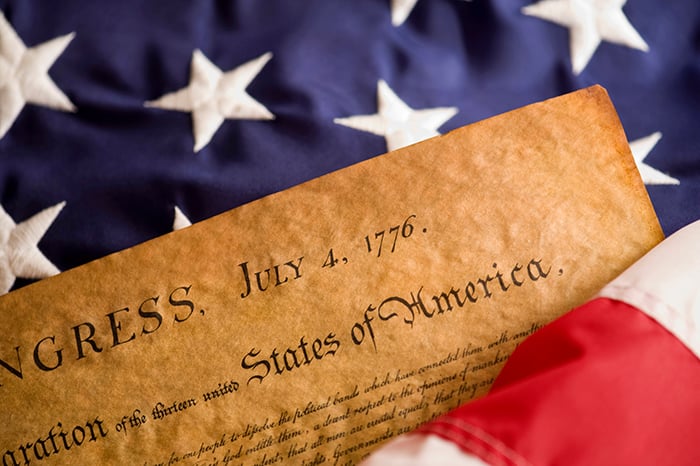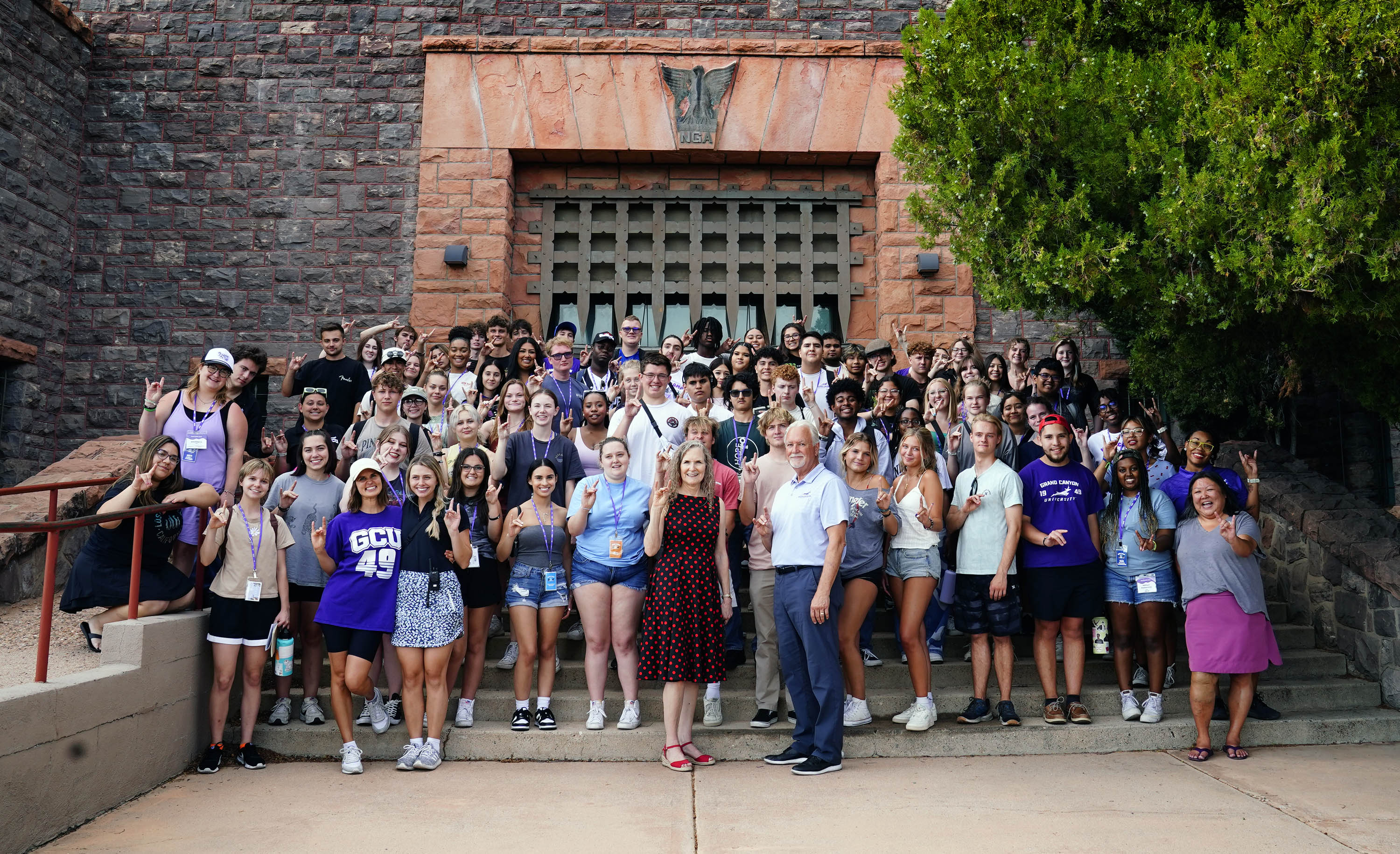
By Dr. David Dean
Assistant Professor of History
Grand Canyon University
American Independence Day on July 4 celebrates the Declaration of Independence and the birth of the United States of America as an independent nation.
However, July 4, 1776, was not the day the Continental Congress declared independence; it did that on July 2. It also is not the day the American Revolution started; that had happened in April 1775. Neither is July 4 the day Thomas Jefferson wrote the first draft of the Declaration of Independence (that was in June 1776), nor the date it was delivered to England (November 1776). July 4 is not even the day colonial leaders signed the Declaration. The Continental Congress did that Aug. 2, 1776.

So why do we celebrate American independence on July 4?
When the American Revolution started in the spring of 1775, most colonists were not looking for total separation from England; rather, they sought better representation in Parliament and the right to continue their habit of self-governing local affairs, as they had since establishing English colonies in North America. The protest over “taxation without representation” soon grew into a list of 27 grievances that questioned England’s administration over the colonists' affairs. Thomas Paine’s pamphlet “Common Sense,” published in January 1776, convinced many that America should be given complete independence from Britain.
Twice before, colonial leaders met to articulate their grievances with the Crown and Parliament, each building important keystones of colonial unity. The Stamp Act Congress and the First Continental Congress composed letters and petitions sent to the king. As England’s policies grew more burdensome, their concerns grew more vocal.
So, the Second Continental Congress gathered again in June 1776 at the Pennsylvania State House (later named Independence Hall) in Philadelphia. Virginia congressman Richard Henry Lee was the first to call for independence by means of a declaration. He was one of the most vocal advocates of this response to England's policies. Lee proposed "that these united colonies are, and of right ought to be, free and independent states; and that all political connection between them and the state of Great Britain is, and ought to be, totally dissolved."
While Congress debated whether they should go ahead and do so, John Adams, Benjamin Franklin, Thomas Jefferson, Robert R. Livingston and Roger Sherman were appointed to a committee to draft a resolution that would carry such a declaration of independence. Thomas Jefferson penned most of the words.
A few weeks later, on July 2, 1776, the committee returned with a draft of the declaration, which the Continental Congress voted nearly unanimously in favor of adopting. For several days, delegates worked on edits and changes until they all finally agreed on the wording, approving the Declaration of Independence on July 4.
Although John Adams considered July 2 independence day, July 4 is universally celebrated as the day America officially became an independent country. Despite the colonies becoming free in 1776, the war with Britain continued until 1781, officially ending in 1783. John Adams wrote his wife, Abigail, that independence day was to be celebrated “by succeeding generations” and suggested "pomp and parade, with shows, games, sports, guns, bells, bonfires and illuminations" throughout the United States. However, the term "Independence Day" was not used until 1791.
In contrast, we celebrate Constitution Day on Sept. 17 of each year, the anniversary of the date the Constitution was signed, not the anniversary of the date it was approved. July 4, 1776, became the date that was included on the actual Declaration of Independence document and the fancy handwritten copy that was signed in August (now displayed at the National Archives in Washington, D.C.). It is also the date printed on the Dunlap Broadsides, the original printed copies of the Declaration circulated throughout the new nation.
Right after the adoption of the declaration, Americans all over celebrated with bonfires, parades and concerts, along with firing muskets and cannons. Public readings also began soon after. The first was on July 8, 1776, in Philadelphia. The following year, the anniversary of the adoption was commemorated for the first time in Philadelphia as the war still went on.
When a Dunlap Broadside was read by George Washington in New York City on July 9, 1776, the words so inspired the people listening that they started a riot. Later that day, they tore down a statue of King George III and later melted it into musket balls for the American army. In 1778, George Washington again celebrated the day by giving his men double rations of meat. Three years later, Massachusetts was the first state to make the Fourth of July an official holiday.
For the first 15 or 20 years after the Declaration was written, Independence Day wasn't celebrated on any particular date. The country was too new and had too much else happening.
By the 1790s, a time of bitter partisan conflicts, the Declaration had become controversial. One party, the Democratic-Republicans, admired Jefferson and the Declaration. The Federalists thought the Declaration was too French and too anti-British, inconsistent with their current policies. By 1817, even John Adams complained in a letter that America seemed uninterested in its past. After the War of 1812, the Federalists were coming apart, and the new parties of the 1820s and 1830s considered themselves inheritors of Jefferson and the Democratic-Republicans. Printed copies of the Declaration circulated again, all with July 4, 1776, listed at the top.
Celebrations of the Fourth of July became more common as the years went on, and in 1870, almost 100 years after the Declaration was written, Congress first declared July 4 to be a national holiday as part of a bill to officially recognize several holidays, including Christmas. Further legislation about national holidays, including July 4, was passed in 1939 and 1941.
In 1826, former presidents Thomas Jefferson and John Adams died on the 50th anniversary of the Declaration of Independence. President John Quincy Adams called their passing "visible and palpable remarks of Divine Favor."
Other notable events in American history that took place on July 4:
- 1831: "America (My Country 'Tis of Thee)" is first sung in Boston.
- 1863: General Robert E. Lee's Army of Northern Virginia withdraws from Gettysburg. Meanwhile Vicksburg, Mississippi, surrenders to Union forces under the command of Gen. Ulysses S. Grant, marking a turning point in the American Civil War.
- 1876: News of General George Armstrong Custer's defeat at Little Big Horn reaches Washington D.C., putting a pall on the national celebration.
- 1884: Statue of Liberty presented to U.S. in Paris as a gift from the French people to America and to commemorate the abolition of slavery. The Statue of Liberty, or fully titled, Liberty Enlightening the World, depicts Liberty striding forward with a torch raised in her right hand, her left holding a tabula ansata with the date of the declaration of independence. Emma Lazarus' poem "The New Colossus," composed to raise money for the statue, was inscribed inside the pedestal in 1903 with its famous lines "Give me your tired, your poor, your huddled masses yearning to breathe free."
- 1888: The oldest rodeo competition held in Prescott, Ariz., was organized by local business professionals, providing an opportunity for local cowboys and ranchers to demonstrate their skills to the public.
- 1905: Baseball Hall of Fame pitchers Rube Waddell (A's) and Cy Young (Boston) match up in a 20-inning classic; Philadelphia wins 4-2.
- 1997: U.S. space probe Pathfinder lands on Ares Vallis Mars.
Born on the Fourth of July:
- Calvin Coolidge is the only U.S. president who was born on the Fourth of July. Born on July 4, 1872, in tiny Plymouth Notch, Vermont, Coolidge took office when President Warren G. Harding died suddenly on Aug. 3, 1923.
- Two other famous contributors to American culture also were born on July 4. Stephen Foster, known as the "father of American music," was born on July 4, 1826, the same day that Thomas Jefferson and John Adams died. Foster is famous for American folk classics such as "Oh! Susanna" and "Old Folks at Home (Swanee River)." "The Scarlet Letter" author Nathaniel Hawthorne was born on July 4, 1804, in Salem, Massachusetts, where his great-great-grandfather played a role in the town's infamous witch trials.
- More recently, Malia Obama was born on July 4, 1998.
What the Declaration of Independence did that was worth celebrating:
On July 4, 1776, the Second Continental Congress adopted a proclamation that declared to all Americans, Great Britain and the world, that these 13 colonies were and ought to be free and independent from Great Britain. It explained the reasons or justifications for their freedom, and it was used as foreign policy to establish a just cause so foreign governments would help the new nation. More importantly, the declaration also was employed as a tool to enlist undecided colonists into the rebellion and unite members of the Continental Congress around the common cause of victory in the American Revolution.










